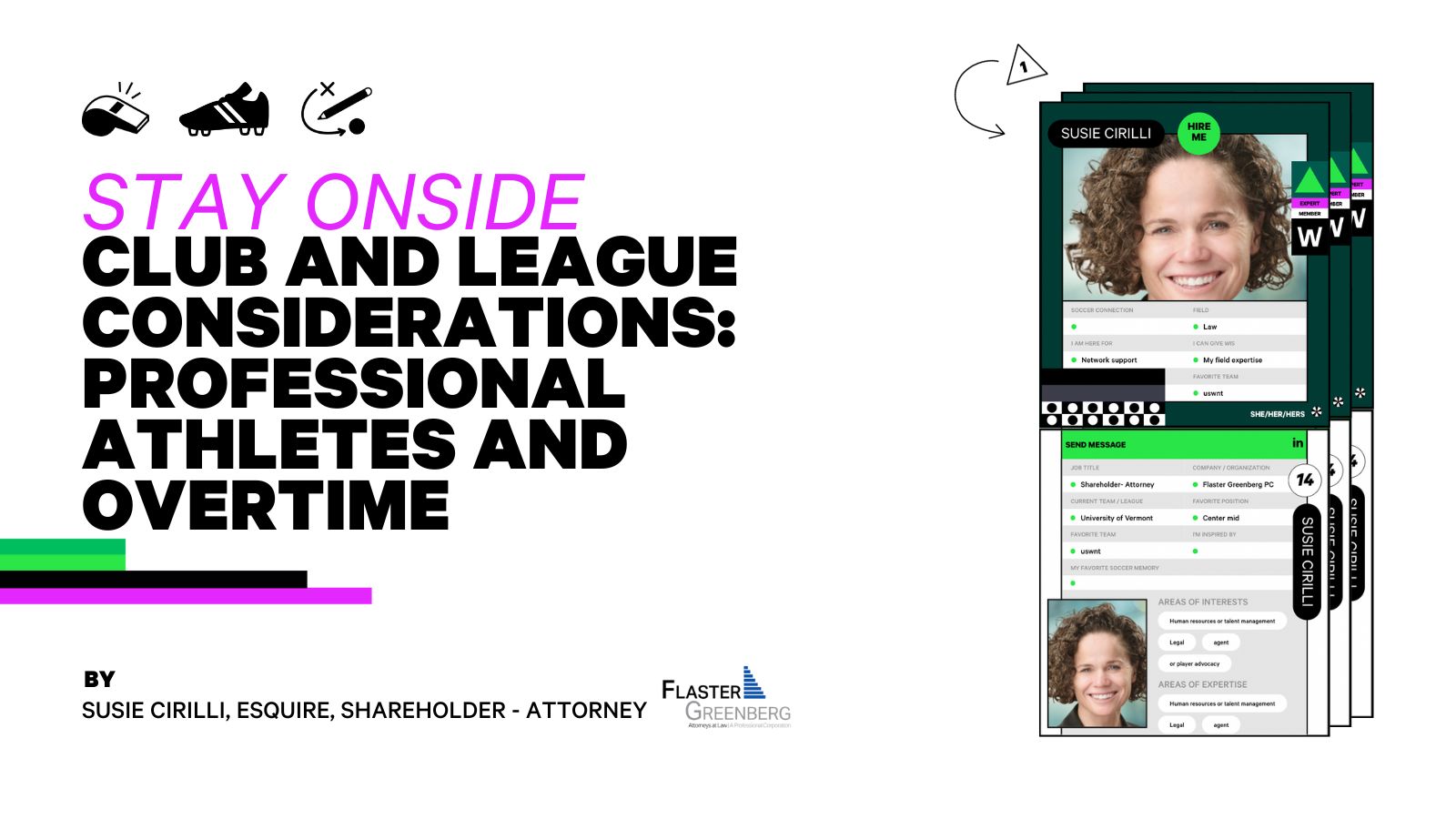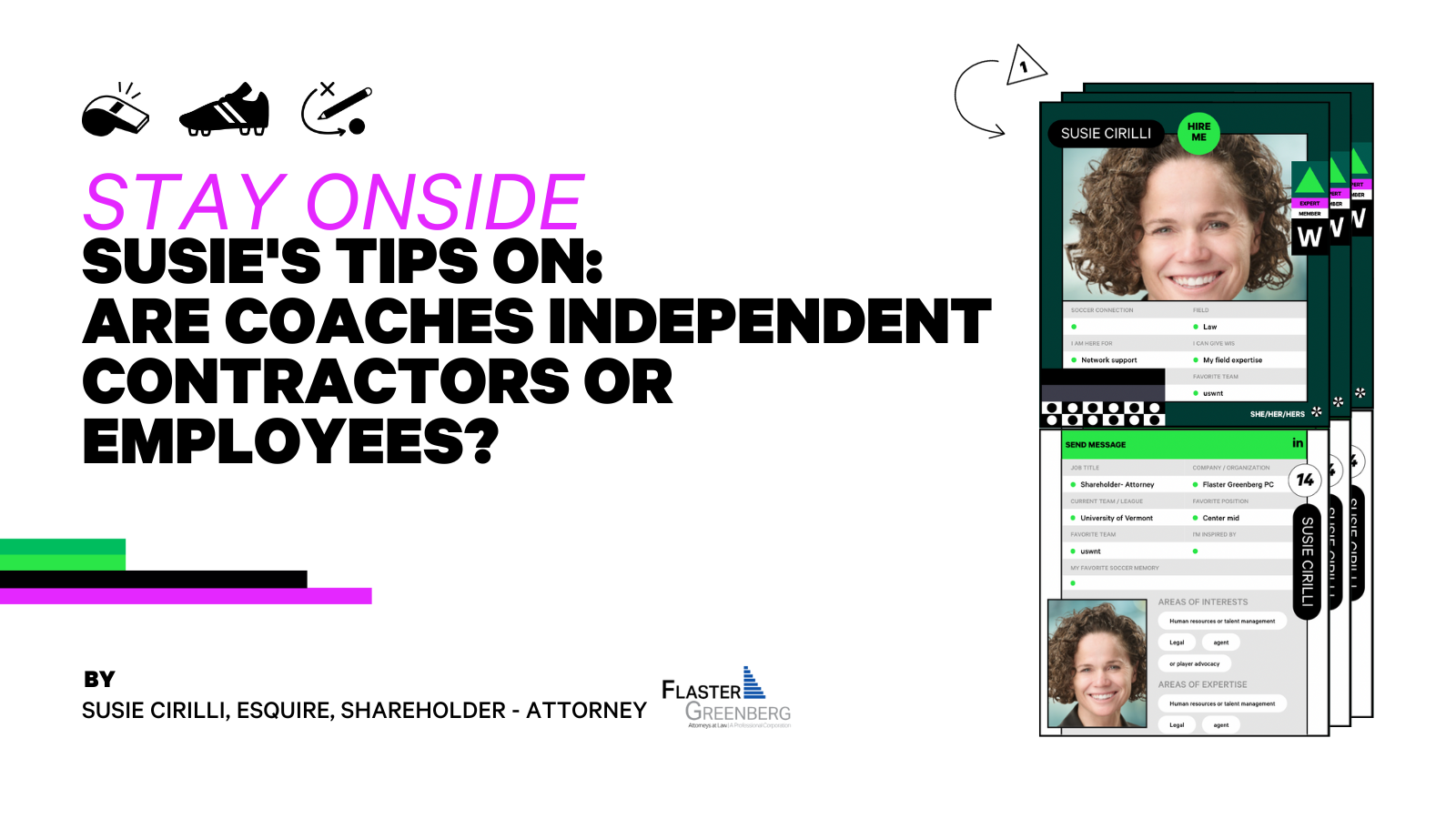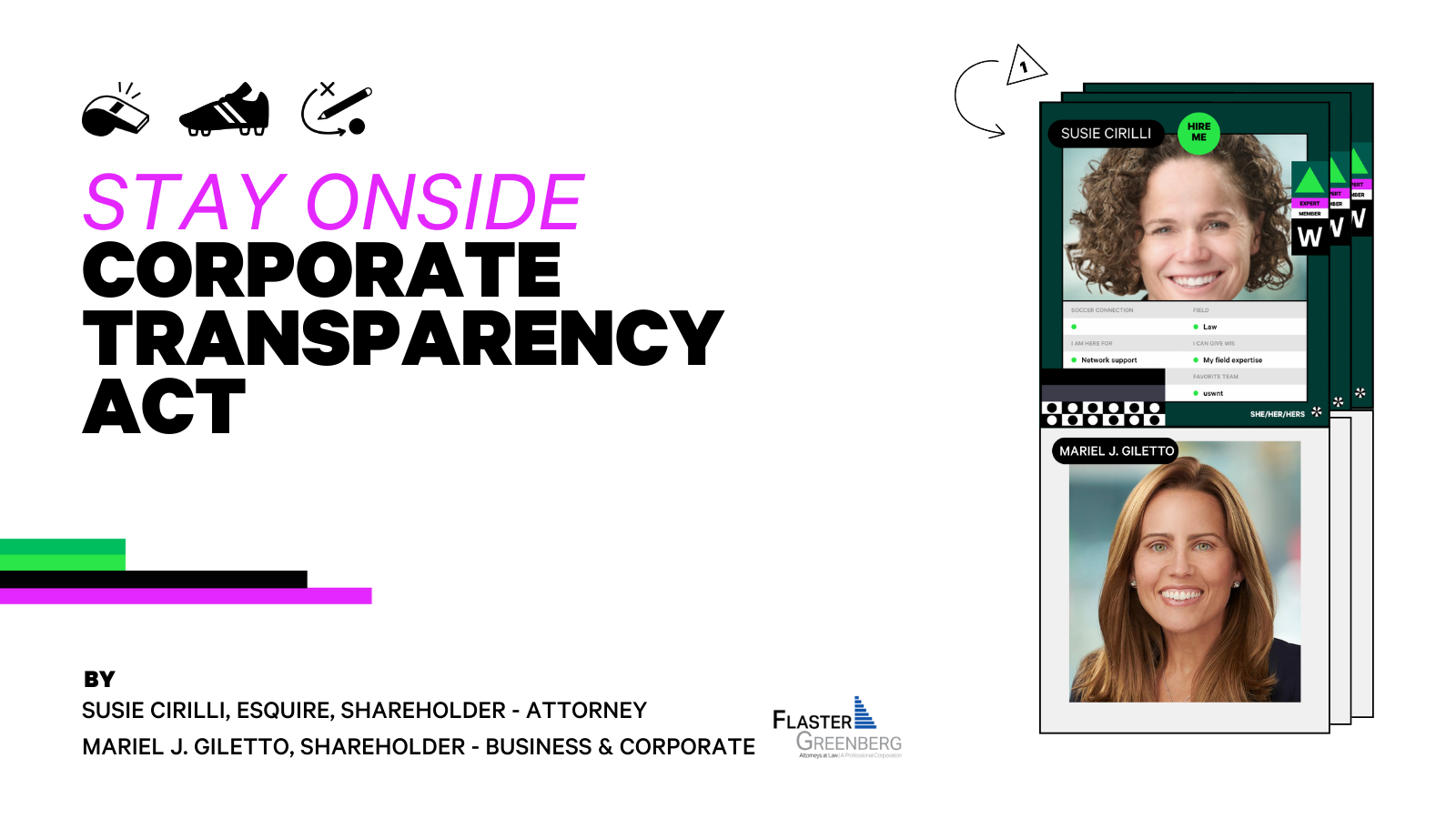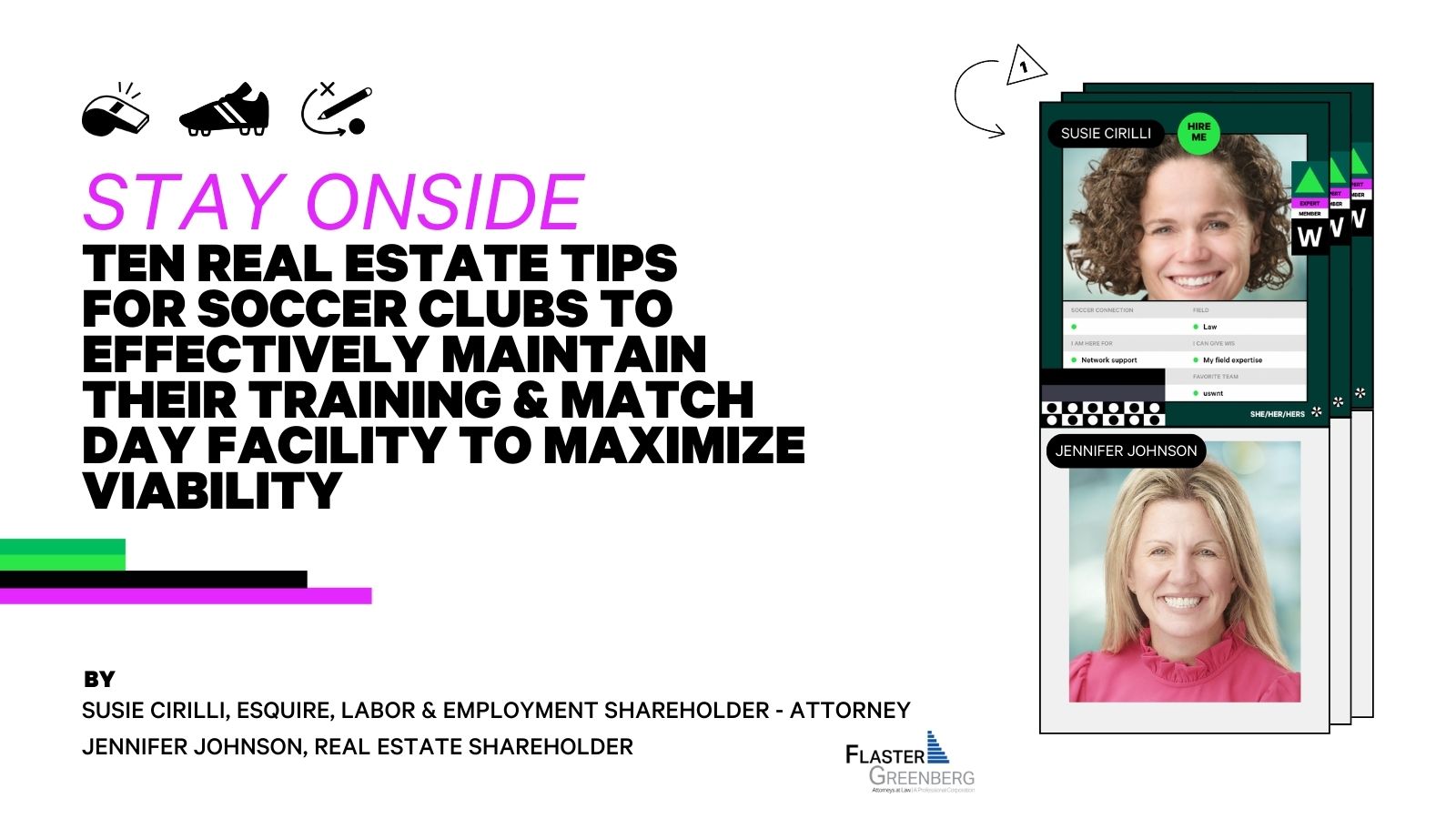Club and League Considerations: Professional Athletes and Overtime
A common misconception is that individuals paid on a salary basis are not entitled to overtime. Another common miscommunication is that if an employee earns a high salary, then that exempts them from earning overtime. Both of these misconceptions are governed by the FLSA.
Lately, the Fair Labor Standards Act has been in the news. On September 8, 2023, the Department of Labor (DOL) issued draft regulations. The comment period on these proposed regulations closed on November 7, 2023. Employers (and their lawyers) are waiting for the finalized regulations. These proposed regulations are important.
Here’s why:
These regulations propose an increase in the minimum salary threshold for exempt professionals. The current minimum salary requirement for the Professional, Administrative, or Executive exemption is $684 per week, and the proposed regulations raise this to $1059 per week. The current minimum salary for the Highly Compensated Employee is $107,432, and the proposed regulations raise it to $143,980.
If passed, the new regulations will mean that some individuals who are currently exempt from overtime may be eligible. For instance, a teacher making less than $1059 per week ($55,068 annual), will be entitled to overtime.
Whenever there is a proposed rule update, it is always an opportune time for employers to reassess and examine their employees and ensure that everyone is properly classified as exempt (not entitled to overtime) or non-exempt (entitled to overtime). Prudent clubs and leagues will revisit their job descriptions and evaluate the actual duties performed by every employer to ensure that all employees are appropriately classified.
A particular area worth attention is whether professional athletes are exempt from overtime.
CONSIDERATIONS FOR CLUBS AND LEAGUES: ARE ATHLETES ENTITLED TO OVERTIME?
This blog explores the following:
(1) What exactly is the FLSA?
(2) What does it mean to be exempt?
(3) Where do professional athletes land?
(4) How Clubs and Leagues can minimize exposure under the FLSA.
Let’s take it from the top:
#1 WHAT IS THE FAIR LABOR STANDARDS ACT?
The FLSA is a federal law setting the requirements for minimum wage and overtime. Please note that this blog (1) only addresses federal law, and (2) only addresses the issue of overtime, not minimum wage. Cautious clubs will confirm whether their home state has overtime and minimum wage requirements. As we know, employers must adhere to the both the federal and state laws.
What Employers Have to Follow the FLSA?
Answer: Essentially all employers.
The FLSA uses a broad definition of employer. The statute defines an employer as follows:
Employer includes any person acting directly or indirectly in the interest of an employer in relation to an employee…but does not include any labor organization…
Some leagues are set up as single-entity structures, where the players have an agreement with the leagues and play for a specific club. Clubs and leagues must be aware of their relationship to each other.
Who is the Employer? The Club or the League?
Answer: Depends.
Clubs and leagues can be deemed a Joint Employer for the purposes of the FLSA. In fact in, Senne v. Office of the Commissioner of Baseball, the Northern District of California found strong support for the notion that Major League Baseball was a Joint Employer with the Clubs (See, p. 51). The Court reviewed factors such as: (1) MLB’s scouting policy; (2) MLB’s draft; (3) MLB’s control over the other players that weren’t drafted; and (4) MLB’s control over the contract process (see, p. 71). (The Senne case settled earlier this year.)
What is the Overtime Law?
Answer: Non-Exempt Employees are owed 1.5 the regular rate for all work performed in a work week beyond 40 hours.
The statute reads as follows:
…no employer shall employ any [employees] who in any workweek is engaged in commerce or in the production of goods for commerce or who is employed in an enterprise engaged in commerce or in the production of goods for commerce, for a workweek longer than 40 hours…unless the employee received compensation in excess of 40 at a rate of at least 1.5 times the regular rate.
While beyond the scope of the blog, it is worth mentioning that the FLSA is purposefully broad and inclusive. In addition to case law, the Federal Regulations include definitions and examples that clarify the above highlighted phrases. Prudent clubs and leagues will consult with counsel to obtain guidance about, among other things: (1) how to calculate the 40 hours, and (2) the ”regular rate.”
#2 THE EXEMPTIONS
As discussed briefly above, not all employees are eligible for the Overtime (1.5 regular rate beyond 40 hours).
We will discuss five (5) major exemptions from Overtime: (1) Collective Bargaining Agreements, (2) Baseball Players, (3) Executive, (4) Administrative, (5) Professional and (6) Highly Compensated Employee.
#1: COLLECTIVE BARGAINING AGREEMENTS (“CBA”)
Before getting into the common exemptions, it is worth noting that the FLSA provides an exemption for employers operating under certain CBA’s. The FLSA actually explains that an employer is not in violation of the Overtime Rule if the employee is employed under a CBA that provides certain limits on hours, and duration.
For example, there is no violation if an employee is employed under a CBA that provides that an employee, “shall not be employed more than 1,040 hours during any period of 26 consecutive weeks….”
Section 207(b)(2) provides more specific hours and duration requirements that could be included in a CBA to exempt an employer from the overtime requirements. For instances, the CBA must provide that “…during a 52 consecutive week period, the employees shall not be employed more than 2240 hours and guaranteed a minimum of 1840 hours…”
Bottom Line:
As discussed below, there is an extremely sound argument that professional athletes are not exempt under the FLSA and are owed overtime under the FLSA.
Prudent clubs and leagues will (1) conduct a proper analysis of the exempt status of their athletes, and (2) collaborate with unions and explore including the hour and duration restrictions included in Section 207(b)(1) and (2). If feasible, amending the CBA may be a viable option so that clubs/leagues are not encumbered with the record-keeping and time-tracking requirements of the FLSA.
#2: BASEBALL PLAYERS
The FLSA includes a specific exemption for baseball players. The Save America’s Pastime Act was added to the FLSA on March 23, 2018. The exemption reads as follows:
[The Minimum Wage and Overtime Requirements of the FLSA] shall not apply to: [a]ny employee employed to play baseball who is compensated pursuant to a contract that provides for a weekly salary for services performed during the league’s championship season, (but not spring training or the off season) at a rate that is not less than a weekly salary equal to the minimum wage…for a workweek of 40 hours…irrespective of the number of hours the employee devotes to baseball related activities.
Interestingly, neither “championship season” nor “baseball related activities” are defined in the statute or regulations.
Bottom Line:
This exemption should not be overlooked when conducting an assessment of the exempt status of professional athletes. As will be explained in more detail below, it appears that, absent a congressional amendment to the FLSA , professional athletes (excluding baseball players) are owed overtime.
#3: EXECUTIVE, ADMINISTRATIVE, PROFESSIONAL , & HIGHLY COMPENSATED EMPLOYEE EXEMPTIONS
Now we will review the 4 exemptions that are the most common. (NOTE: There is a Computer Professional Exemption (“CPE”);however, it does not affect professional athletes and is therefore not covered by this blog.)
Let’s take a look at the common exemptions and assess their application to professional athletes.
EXECUTIVE EXEMPTION
An employee is exempt (not owed overtime) if the following test is satisfied:
- Compensation. Individual is compensated on a salary basis at least $684 per week (approximately $37,000 annually). (NOTE: The new regulations would require a salary of at least $55,068 annually.)
- Primary Duty. The individual’s primary duty is the management of an enterprise in which the employee is employed or of a customarily recognized department or subdivision;
- Directs the Work of Others. The individual customarily and regularly directs the work of two or more employees; AND,
- Authority to Hire and Fire. Individual has authority to hire and fire others whose suggestions and recommendations as to hiring, firing, advancement, or promotion or any other change of status of other employees are given particular weight.
The highlighted phrases require their own analysis. The phrases “primary duty” and “customarily and regularly” include their own balancing tests. The statute also provides details on how to properly compensate an individual on a “salary basis.”
Bottom Line: Most professional athletes do not qualify under this exemption. Notice the individual MUST get paid the minimum salary and satisfy the remaining requirements. In most scenarios, a professional athlete is not an Executive under this exemption, as they do not manage the club, direct the work of others, and have authority to make or sway employment decisions.
ADMINISTRATIVE EXEMPTION
An employee is exempt under the Administrative Exemption if the following test is satisfied:
- Compensation. Individual is compensated on a salary or fee basis at $684 per week (approximately $37,000 annually) (NOTE: The new regulations would require a salary of at least $55,068 annually.)
- Primary Duty. The individual’s primary duty is the performance of office or non-manual work directly-related to the management or general business operations of the employer or the employer’s customers; and
- Discretion and Independent Judgment. The individual’s primary duty includes the exercise of discretion and independent judgment with respect to matters of significance.
Bottom Line: Professional athletes are most likely not exempt under this Administrative Exemption. The players do not generally perform office work nor manage the general business operations of the club.
PROFESSIONAL EMPLOYEE EXEMPTION
The Professional Employee exemption is amorphous when compared to the Executive and Administrative exemption tests. An individual is exempt as a Professional Employee when:
- Compensation. Individual is compensated in accordance with the FLSA ($684 per week), on a salary basis ( (NOTE: The new regulations would require a salary of at least $55,068 annually.); AND
- Primary Duty. The individual’s primary duty is the performance of work that:
- Learned Professional. Requires knowledge of an advanced type in a field of science or learning customarily acquired by a prolonged course of specialized intellectual instruction; OR
- Creative Professional. Requiring invention, imagination, originality or talent in a recognized field of artistic or creative endeavor.
This exemption includes two types of professionals: (1) the Learned Professional and (2) the Creative Professional.
Let’s take a look at these two types of professionals:
#1- Learned Professional. The Learned Professional must perform work requiring advanced knowledge. The Advanced Knowledge must be in a field of science or learning and must be acquired by a prolonged course of specialized intellectual instruction.
The regulations clarify these requirements by defining the bold phrases:
- What is “work requiring advanced knowledge?” The regulations explain that these are professionals whose work is “predominantly intellectual in character.” Such work requires “consistent exercise of discretion and judgment.” Generally these employees are required to (1) analyze, (2) interpret or (3) “make deductions from varying facts or circumstances.”
- What is a “field of science or learning?” The regulations provide examples of such fields: (1) law, (2) teaching, (3) medicine, (4) theology, (5) accounting, (6) engineering, (7) architecture, (8) various types of physical, chemical, and biological sciences, (8) pharmacy, and (9) “other similar occupations that have recognized professional status…”
- What is a “prolonged course of specialized intellectual instruction?” The regulations define this phrase as a profession, “where a specialized academic training is a standard prerequisite for entrance into the profession.”
Bottom Line: Most professional athletes do not seem to fit under the “Learned Professional Exemption.”
#2 – Creative Professional. These individuals are employees whose primary duty must be the performance of work requiring invention, imagination, originality or talent in a recognized field of artistic or creative endeavor as opposed to routine mental, manual, mechanical or physical work.
The regulations clarify the above bolded phrases:
- What is a “recognized field of artistic of creative endeavor?” The regulations specifically identify such fields as “music, writing, acting and graphic arts” as recognized fields of artistic and creative endeavor. The regulations do not reference athletics.
- What is “work requiring invention, imagination, originality or talent?” The regulations explain that these are usually determined on a case-by-case basis. With that being said, the regulations provide helpful examples:
- Actors
- Musicians
- Conductors
- Soloists
- Painters (“…who at most are given the subject matter of their painting.”)
- Cartoonists. (“…who are merely told the title or underlying concept of a cartoon and must rely on their own creative ability to express the concepts.”)
- Essayists, Novelists, Short-Story Writers and Screen-Play Writers “…who choose their own subjects and hand in a finished piece of work to their employer…”
These specific examples included in the regulations demonstrate the type of employees the statute intends to be covered under the Learned Professional Exemption. Notice that athletes are not included. Prudent Clubs and Leagues will engage in a thorough analysis of whether this exemption applies. With that being said, it is an attenuated position that the professional athletes are Creative Professionals.
Bottom Line: There is a strong argument to be made that professional athletes are not exempt under the Professional Employee Exemption. As discussed above, the Northern District of California rejected MLB’s position that minor league baseball players were exempt under the creative exemption (See Order at p. 105).
HIGHLY COMPENSATED EMPLOYEE EXEMPTION
Some employers are misguided into thinking that, if they pay an employee enough money, then the employee cannot bring a cause of action for overtime. This is simply not true. With that being said, the law affords some grace for employers who decide to compensate their employees above a certain salary. In other words, if an employer pays an employee a certain salary, and the individual performs some duties of an exempt employee (Professional, Executive, Administrative), then that employee may be exempt.
Let’s explore a bit more.
Under the Highly Compensated Employee (HCE) Exemption, an individual is exempt from overtime if the following 2 prongs must be satisfied:
- Compensation. The individual must make the minimum threshold salary. The current minimum salary is: $107,432 (NOTE: DOL proposed new salary amount should be $143,988.); AND
- Customarily and Regularly performs any one or more of the exempt duties or responsibilities of an Executive, Administrative or Professional exempt employee.
However, it is not enough to simply pay an employee the minimum salary ($107,432). Rather, the employee must also perform some of the duties outlined in the Administrative, Executive or Professional exemptions. The regulations explain that a “high level of compensation is a strong indicator of an employee’s exempt status thus eliminating the need for a detailed analysis of the job duties.”
With that being said, paying employees a higher salary does not eliminate the need for an analysis of the job duties. In fact, the regulations succinctly expound on this principle. The HCE exemption applies to employees whose primary duty is office or non-manual work. The regulations explain:
… non-management production-line workers and non-management employees in maintenance, construction and similar occupations such as carpenters, electricians, mechanics, plumbers, iron workers, craftsmen, operating engineers, longshoremen, construction workers, laborers and other employees who perform work involving repetitive operations with their hands, physical skill and energy are not exempt under this section no matter how highly paid they might be.
Bottom Line: Professional Athletes most likely do not qualify under the HCE exemption. Professional athletes use physical skill. There is an argument that they are the “other employees who perform work involving repetitive operations with their hands, physical skill and energy…” and thereby are “not exempt…no matter how highly paid they might be.”
#3 WHERE DO THE PROFESSIONAL ATHLETES LAND?
As explained above, there is a strong argument that professional athletes are not exempt from overtime.
A few things to consider:
- Regulations are Silent as it relates to Athletics. Athletes or athletics are not included in any of the examples provided in the regulations.
- Baseball Carve-Out. There is a specific carve-out for baseball players in the FLSA itself. If athletes were meant to be included in the Professional Exemption, there would be no need for the Baseball Player Carve-Out. If congress intended for the FLSA to make athletes exempt, then would be no need for a specific baseball carve-out.
- Recent MLB Settlement. This class action out of the Northern District of California is instructive on how these types of cases can play out. Absent an amendment to the regulations or statute, it does not appear that professional athletes are exempt from overtime. So what can clubs and leagues do to minimize exposure under the FLSA?
#4 CONSIDERATIONS FOR CLUBS AND LEAGUES
Multi-jurisdictional employers deal with employee overtime every day. Clubs and Leagues simply need to ensure that there are structures in place to ensure that (1) player time is being tracked; (2) records are being maintained; and (3) players are getting paid overtime.
Below are some high-level areas for employer exploration:
- Assess Joint Employer Status. Prudent leagues will assess their joint employer status with their clubs. For more information on the Joint Employer Test under the FLSA, click here.
- Recordkeeping Requirements. Clubs and leagues confirm that they are maintaining records as require by the FLSA. Check out the record keeping requirements on employers.
- Track Time & Pay Overtime
- Track Time. It is essential that employers track all non-exempt employee time. Employers (clubs and leagues) will have to evaluate how best to track athlete time. The law affords employers flexibility on how to track time.
- Work Week Definition. A workweek under the FLSA is a “regularly recurring period of 168 hours- 7 consecutive 24 hour periods.” The FLSA also allows employers to calculate the workweek based on a Fluctuating Workweek Method (FWW). This is useful when an employee’s hours fluctuate from week to week- much like the week of a professional athlete. With that being said, it is crucial for employers to understand their local jurisdictions. For example, the PA Supreme Court held that the FWW is an invalid method of calculating the workweek.
- Regular Rate of Pay Calculation. It is important for employers to understand what constitutes the Regular Rate of Pay. For more info, click here.
- Compensable Time. Employers (clubs and leagues) must have a solid handle on what is considered Compensable Time.
- DOL Information on Compensable Time
- Federal Regulations provide clear guidance on compensable time addressing specific and often-litigated issues.
- Assess Amusement Exception. Clubs and Leagues may want to consult with counsel to assess whether the amusement exception applies to their club. Briefly, the Amusement Exemption applies to an amusement or recreational establishment, organized camp, or religious or nonprofit educational conference” that:
- Does NOT operate for more than seven months in any calendar year; OR
- During the preceding calendar year, the average receipts for any 6 months of such year were not more than 33.3 % of the average receipts for the other 6 months.
- Seek Counsel. As always, employers should seek proper counsel on this issue. In fact, the District Court of the Eastern District of Pennsylvania recently held in Su v. East Penn Manufacturing that evidence of an employers’ adherence to the advice of counsel can be used to minimize if not eliminate liquidated damages liability under the FLSA. In that case, the employer was found to have violated the FLSA and was hit with $22 million in liquidated damages. However, the Judge found that liquidated damages were inappropriate because the employer listened to the advice of counsel and implemented a policy that attempted to bring the employer into compliance. Following counsel’s advice saved the employer $22 million.
FINAL THOUGHTS…
The issue of employee classification is one that every single employer in the U.S. must address. Once a solid framework is established, clubs and the employees (players) will get into a routine of tracking time and paying overtime.
*This blog addresses issues under the federal law (FLSA). There are many states and local jurisdictions with their own wage payment and collection laws. Prudent employers (clubs and leagues) will consult with counsel to confirm compliance.*








